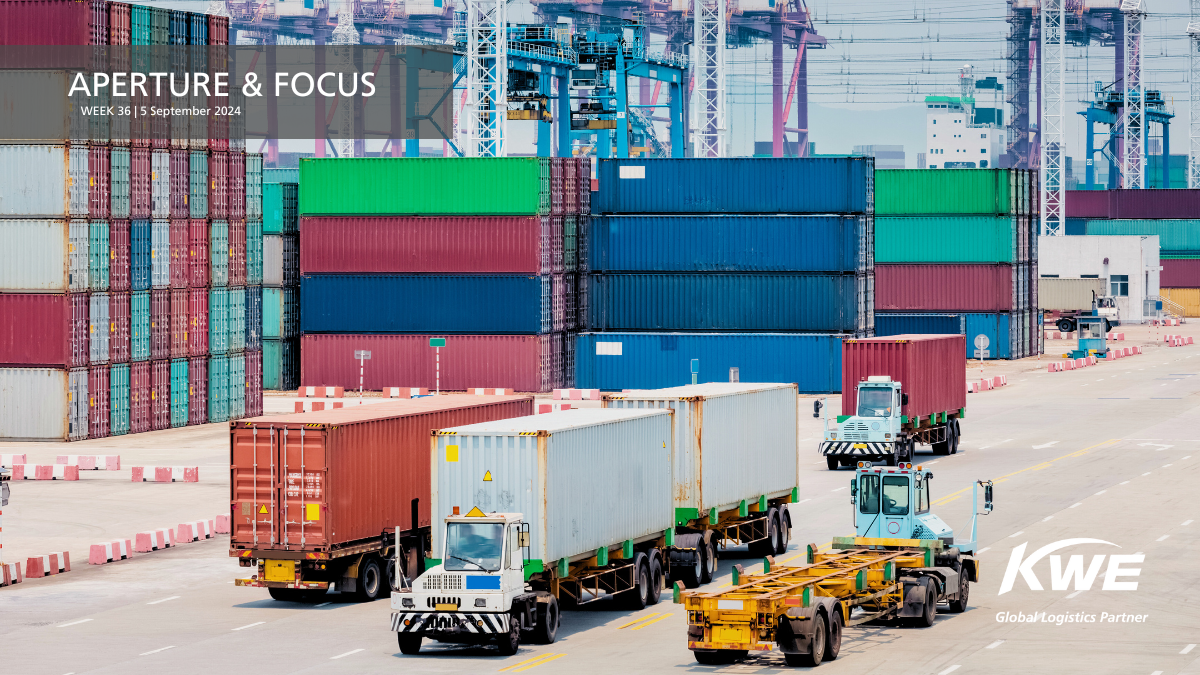Quote
Aperture & Focus 2024: Week 36

Global Aperture
Container carriers face increasing pressure to order new vessels now to stay competitive, as lengthy lead times are exacerbated by large orders for Liquefied Natural Gas (LNG) carriers, which occupy shipyards for extended periods. The competition for yard slots is intensifying, with shipowners needing to decide well-in advance on future fuel strategies amidst limited capacity and skilled labor shortages in shipyards.
Air cargo demand continued to grow strongly in July 2024, marking the eighth consecutive month of double-digit growth. Additionally, capacity rose, with a 12.8% increase in international belly capacity and 6.9% in freighter capacity. Due to global trade, e-commerce, and maritime capacity constraints, air cargo demand is expected to be robust during the upcoming peak season.
Regional Focus
Americas
U.S. intermodal rail traffic surged in late August due to an early peak in shipping, driven by containerized imports and efforts to secure retail merchandise amid global supply chain disruptions. Meanwhile, Canadian railroads experienced a decline in carload and intermodal traffic due to labor disputes, while Mexican railroads saw a moderate increase in both carloads and intermodal units.
United States: O'Hare International Airport has completed the final phase of its Northeast Cargo campus, expanding its cargo capacity with an additional 130,000 square feet of space and new aircraft parking positions. This development strengthens Chicago’s role as a global shipping hub and creates hundreds of new jobs.
California's Department of Motor Vehicles has released a draft framework on August 30th for the operation of autonomous heavy-duty trucks, aiming to establish safety standards and permitting phases for testing and deployment. The proposed regulations would allow these trucks to operate on certain high-speed roads, but they exclude certain types of commercial operations like hazardous material transport for safety reasons.
Asia-Pacific
India: Severe weather on September 2nd caused major delays and cargo backlogs at many Indian ports, especially Mundra Port, which was hit hard by flooding and heavy rain. The disruptions have caused a ripple effect on supply chains, with extended waiting times for vessels and increased delays for truckers and freight operators at other ports such as Nhava Sheva.
Kempegowda International Airport (BLR) in Bangalore and Delhi International Airport (DEL) have both achieved Level 5, the highest tier in the Airport Carbon Accreditation program. Both airports are making significant strides in reducing their carbon emissions, with Kempegowda focusing on renewable energy and afforestation, and Delhi International enhancing its use of electric vehicles and solar power.
China: Chinese ports have processed 190.9 million twenty-foot equivalent units (TEUs) between January and July 2024, showing an 8.3% increase from the previous year. Shanghai and Ningbo Zhoushan Ports have reported substantial year-on-year growth in container throughput, with Shanghai rising by 15.1% and Ningbo Zhoushan by 5.3%.
Europe, Middle East & Africa
Belgium: On August 29th, Belgium’s transport minister withdrew the proposed ban on freighter aircraft operating at Brussels Airport during the night. The decision was influenced by backlash from regional authorities and concerns that using smaller aircraft would increase overall noise levels.
Liege Airport is investing in rail and road connectivity with infrastructure upgrades through 2030. Planned enhancements will modernize the road-rail platform, increase its capacity to handle 45 trains per week, and strengthen the airport's role as a key logistics hub.
Sweden: On August 30th, the Port of Gothenburg inaugurated a new terminal, spanning 144,000 square meters. This facility will enhance transportation capacity, improve efficiency by consolidating operations, and provide better access to road and rail networks.